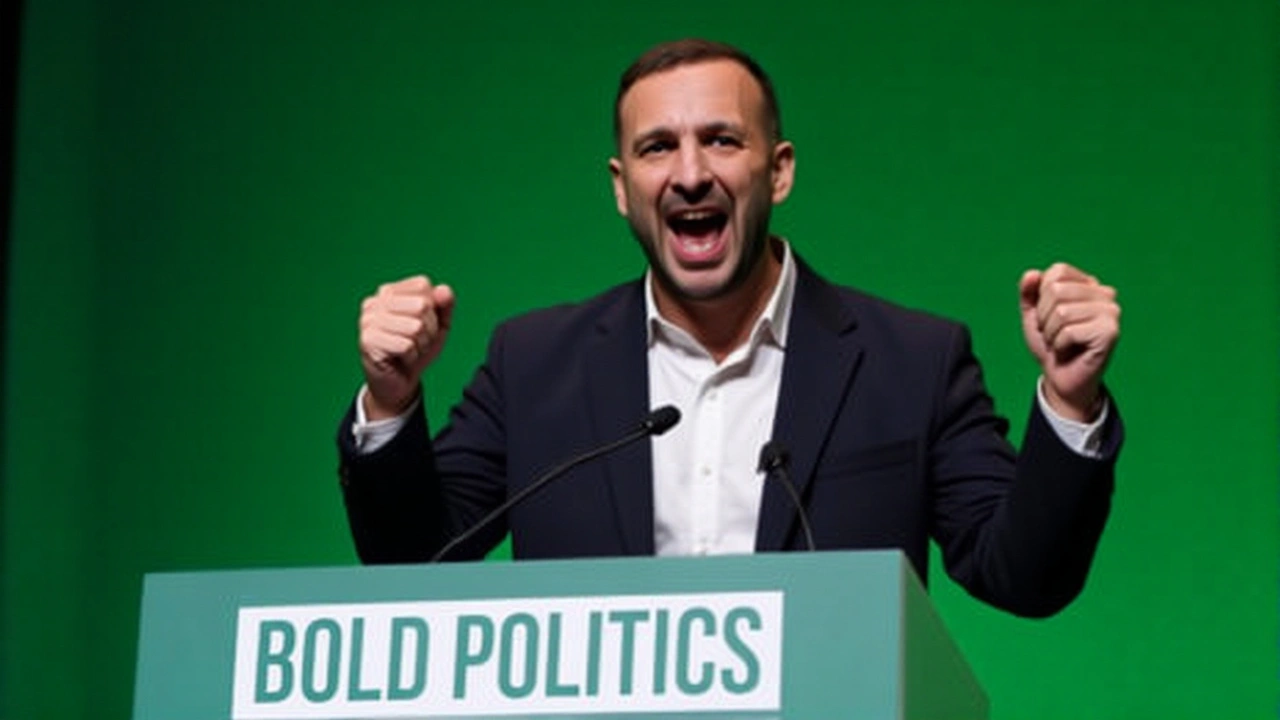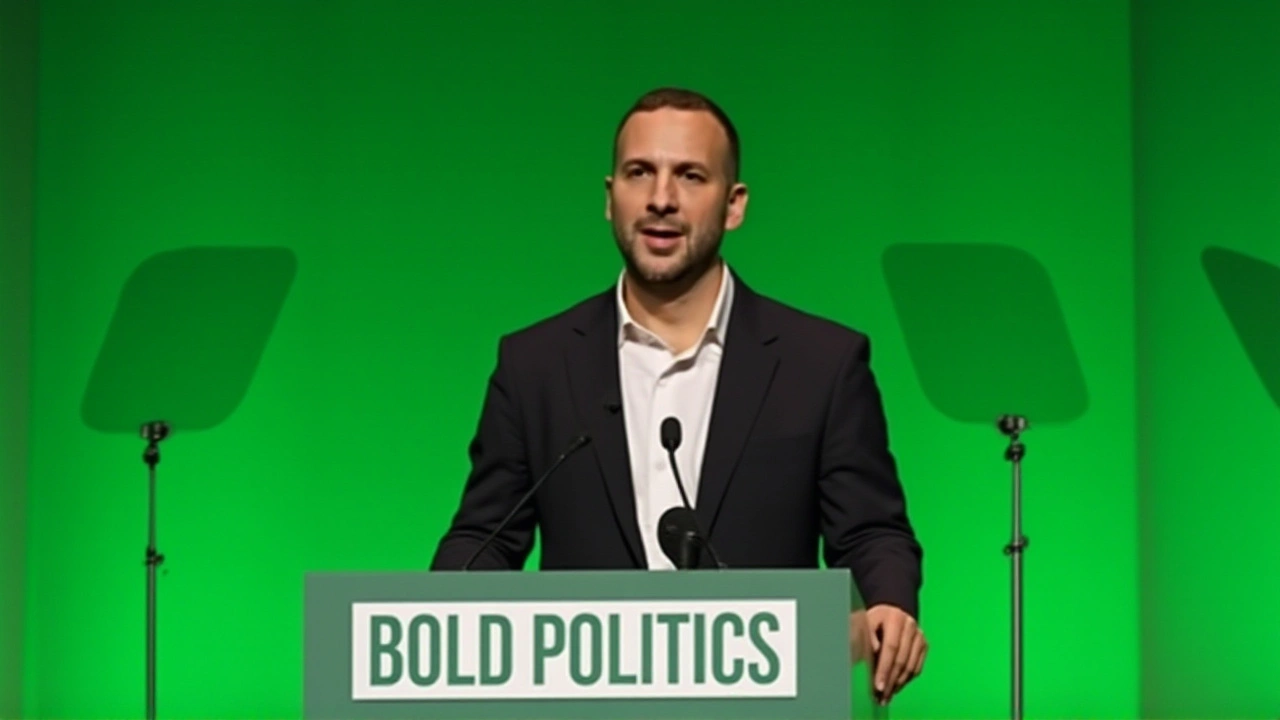When Zack Polanski, leader of the Green Party of England and Wales took the stage at the Green Party Conference 2025conference hall in England, he launched a blistering critique of what he called a “political class poisoned by extreme wealth.” The packed room, filled with activists, local councillors and party officials, listened as the new leader painted a picture of rising homelessness, rent insecurity and a water system he argued was being “privatised at the public’s expense.”
- Key Fact: Rough sleeping is up 164% since 2010, according to the latest Shelter report.
- Half of all renters could lose their homes after just one missed paycheck.
- Polanski says each household pays a £250 “privatisation premium” annually.
- The Green Party now officially welcomes all migrants and refugees.
- Polanski was elected leader in September 2025, succeeding Caroline Lucas.
Background: The Green Party’s Leadership Change
After a year‑long leadership contest sparked by Caroline Lucas’s retirement, the party members voted overwhelmingly for Polanski on September 15, 2025. His victory was driven by a surge in younger members who wanted a more aggressive stance on climate, housing and social inequality. Caroline Lucas had steered the Greens through a period of modest parliamentary gains, but critics argued the party needed a louder voice in the post‑Brexit political arena.
The new leader’s platform, unveiled in his pre‑conference policy paper, promised a "green new deal" that combined renewable energy investment with rent controls and an end to water privatisation. The conference on October 2 was therefore a litmus test: could Polanski translate policy promises into a rallying cry that resonated with both longtime supporters and undecided voters?
Polanski’s Opening Remarks: A Stark Diagnosis
Polanski began with a simple, almost rhetorical question: “Who benefits when a handful of people control our wealth?” He then cited the latest Office for National Statistics data showing that the top 1% now own 28% of UK property assets, a figure that has climbed by over 5% since 2018. "This is a country with so much going for it, but we have been time and time again failed by a political class poisoned by extreme wealth," he said.
He backed up the claim with a harrowing statistic: since 2010, the number of people sleeping rough has risen by 164%, a surge the party attributes to soaring rents and insufficient social housing. The speaker’s tone was urgent, almost pleading, as he warned that “if we don’t act now, we risk normalising a society where homelessness is a permanent fixture.”
Housing and Water Issues Highlighted
One of the most striking sections of the speech revolved around the precarious situation of renters. Polanski revealed that 50% of private‑rented households are just one paycheck away from eviction. "A single missed rent payment can push a family into crisis," he warned, urging the government to introduce a statutory rent‑freeze for the next three years.
He also turned his ire towards the water industry. Citing a report by the Consumer Council for Water, Polanski claimed that commercial water companies are “pumping sewage into the water and charging us extra for the privilege.” He quantified what he labelled the “privatisation premium” at £250 per household each year – a hidden cost that, according to him, stems from the sale of shared assets to private investors.
To give context, he referenced the 2022 deregulation that allowed three major firms – Severn Trent Water, Thames Water and United Utilities – to increase tariffs by an average of 8% annually. “When a basic necessity becomes a luxury, we have failed as a society,” Polanski declared.
Immigration Stance and Party Vision
Switching gears, Polanski addressed a topic that often divides the UK electorate: immigration. "We'll say it loud, and we'll say it clear, migrants and refugees are welcome here," he pronounced, positioning the Greens as a humane alternative to the hard‑line rhetoric of the current government.
He highlighted the economic contribution of migrants, noting that a 2024 Institute for Public Policy study estimated they add £23 billion to the UK GDP each year. By coupling this data with a moral appeal, Polanski framed his message as both compassionate and pragmatic.
Concluding his opening, he issued a rallying cry: “Friends, it is time to take it back.” The phrase echoed the classic protest chant, designed to galvanise the crowd and signal the Greens’ intent to reclaim political space from the entrenched establishment.
Political Reactions and Expert Analysis
The speech quickly became a talking point on both sides of the House of Commons. Sir Keir Starmer, leader of the Labour Party, praised the emphasis on housing but warned that “tax‑heavy solutions risk stifling growth.” In contrast, Conservative MP Jacob Rees‑Mogg dismissed the remarks as “populist hyperbole,” insisting that market‑driven reforms are the only path forward.
Housing policy expert Dr. Amelia Clarke of the University of Manchester called the statistics “alarmingly accurate,” but cautioned that “rent‑control without supply‑side measures could exacerbate shortages.” Meanwhile, environmental economist Prof. Liam O'Connor praised the water‑privatisation critique, noting that “public‑ownership models tend to deliver lower prices and higher service quality.”
What Lies Ahead for the Greens
Polanski’s speech set the tone for the Green Party’s 2026 general election strategy. The party plans to field candidates in all 650 constituencies, a marked increase from the 2022 tally of 300. Their manifesto, expected to be published in January 2026, will likely expand on the themes introduced in October – a “Green New Deal” that promises 5 million new affordable homes, a cap on water tariffs, and a pledge to double the UK’s renewable energy capacity by 2035.
Critics say the agenda is ambitious, perhaps overly so for a party that currently holds just 12 seats in the House of Commons. Yet supporters argue that the clear, data‑driven narrative Polanski offered could attract swing voters disillusioned with both Labour and the Conservatives.
In the weeks to come, the Greens will be watching the polling numbers closely. Early Euro‑polls released on October 10 showed a modest 4% rise in Green support after the conference, indicating that the message may be resonating, but whether it translates into seats remains to be seen.

Frequently Asked Questions
How does Polanski’s housing policy affect renters?
Polanski proposes a statutory rent‑freeze for three years, coupled with increased funding for social housing. If enacted, renters would face lower monthly costs and a reduced risk of eviction, though critics warn that without expanding housing supply, rents could stay artificially low and deter new construction.
What is the "privatisation premium" Polanski mentioned?
The "privatisation premium" refers to the estimated £250 extra each household pays annually for water services that were once publicly owned. Polanski argues that reversing water‑company privatisation would eliminate this hidden surcharge and lower bills for consumers.
Will the Greens’ open‑door stance on migrants influence public opinion?
Polling after the conference shows a slight uptick in support among younger voters, who tend to favour inclusive immigration policies. However, among older demographics, the stance may still provoke resistance, making it a polarising but potentially mobilising issue for the party.
What challenges does the Green Party face in the next general election?
With only 12 MPs currently, the Greens must overcome the first‑past‑the‑post system that favours larger parties. Translating popular support into actual seats will require targeted campaigning in constituencies where the vote margin is narrow, as well as potential electoral reform advocacy.
How does Polanski’s speech compare to previous Green Party leaders?
Unlike his predecessor Caroline Lucas, who emphasized gradual environmental progress, Polanski adopts a more confrontational tone, focusing on wealth inequality and privatisation. This shift signals a strategic pivot aimed at capturing voters frustrated with the status quo.

Write a comment